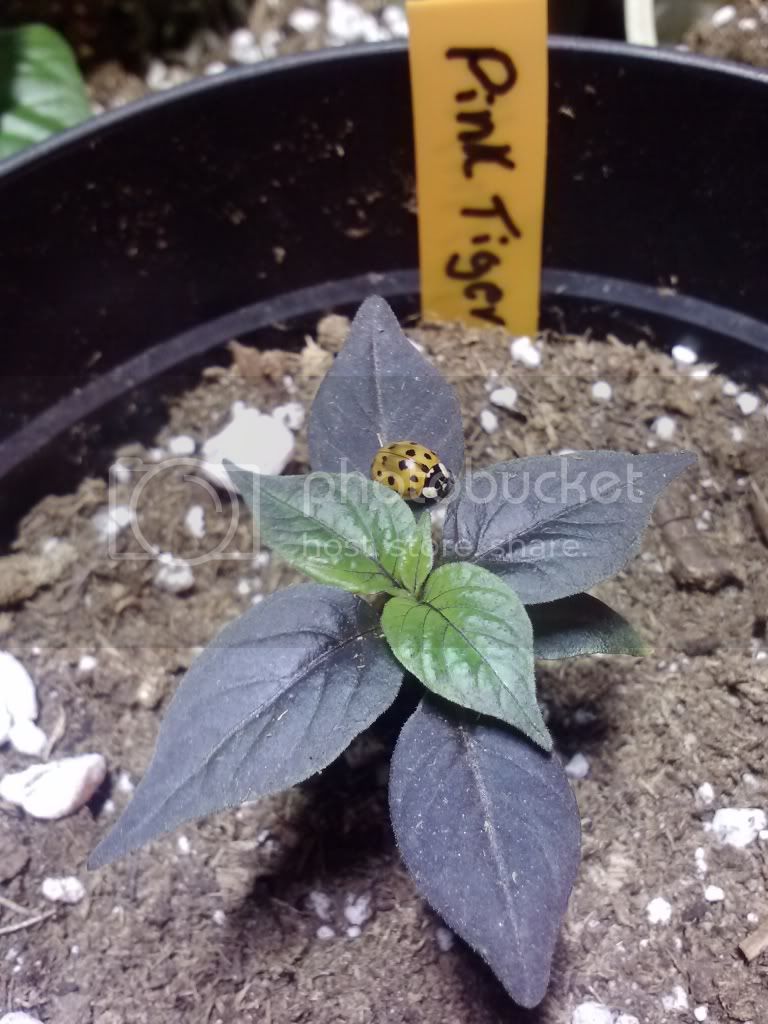My seedlings have 2-4 sets of leaves in them and I recently discovered that they have aphids under their leaves! What can I do? What would be safe to use on my seedlings?
Thanks in advance
Thanks in advance
Thanks for this. Might try that Foil trick on a few of them.Brain Strain Pepper Head said:I boil lemon peel, orange peel, add garlic and few drops soap or a organic soap spray. Or you can use any of these:
Natural Aphid Pesticides: Neem Oil
Pure neem oil, an oil derived from the neem tree, has long been used in many natural remedies, including pest control. The oil, or Azadirachtin, acts as a repellent and growth regulator. To the insects, the neem oil has a bitter taste, so they will not eat the leaves treated with it. Also, if the insects do come in contact with the Azadirachtin, it prevents the larvae from growing into adults. Neem oil can be purchased at various online stores or made from neem trees.
Natural Aphid Pesticides: Homemade Lemon Spray
This natural aphid pesticide works as an instant remedy, killing the aphids on contact. To make this natural pesticide, grate the rind of a large lemon. Boil it in enough water to fill a garden spray bottle. Let the mixture sit overnight. Drain the liquid into the garden spray bottle. Spray the aphids and larvae directly. It will cause them to convulse.
Natural Aphid Pesticides: Homemade Vinegar Spray
Get out a spray bottle and fill it 1/3 of the way with distilled white vinegar and the rest of the way with water. This will kill the aphids and larvae on contact. Some plants react badly to the vinegar. It's important know which plants you can and cannot use this method with.
Natural Aphid Pesticides: Aluminum Foil
Place a square of aluminum foil around the base of plants affected by aphids. This causes light to bounce around to the underside of the leaves, which repels the aphids. It is also good for the plants, as it brings them more natural sunlight.
Natural Aphid Pesticides: Calcium Powder
Sprinkling calcium powder around the base of the plants is another natural aphid repellent. The aphids do not like the calcium and will generally stay away from it.
Natural Aphid Pesticides: Yellow Plastic Bowl
Aphids are naturally attracted to the color yellow. Place a yellow plastic bowl filled about 1/3 of the way with water in the center of the infested area. Many of the aphids will be drawn to the bowl and will go into the water and die.
Natural Aphid Pesticides: Banana Peels
Burying shredded banana peels around the base of plants is an odd, but effective remedy. It has been around for ages and many gardeners will swear by it.
Natural Aphid Pesticides: Smash Their Buddies
Squashing a few aphids near the infested area will signify to the other aphids that it is time to go. It's a chemical reaction.
Natural Aphid Pesticides: Ladybugs
Ladybugs can be purchased at garden and home improvement centers. The ladybugs feed on the aphids and if you purchase enough, the aphids will be gone in no time. Ladybugs are also good for the garden in other ways.
Natural Aphid Pesticides: Garlic or Onions
Planting garlic or onions is another natural aphid deterrent. They do not like garlic or onion and will not likely come near an area they are in.
I'll try this on one seedling, see how that goes. At the moment, I have 50 seedlings 11 fruiting plants.Geonerd said:My little guys have the same issue. I happened to have some neem oil spray under the counter and have been applying it directly to the bastards with q-tips. This takes a bit of time, but limits the plant's exposure to the potentially damaging stuff. Just touching the aphids with a wet swab gets enough oil on them do the trick. Assuming you don't have more than 10~20 plants, you could do the same with any number of toxic compounds or insecticides.


Big Mike said:Some years, they will lay eggs and if you can get some ladybug larva going, they will eat a lot of aphids.
Big Mike
Visit us Online: www.knot2worry.us
